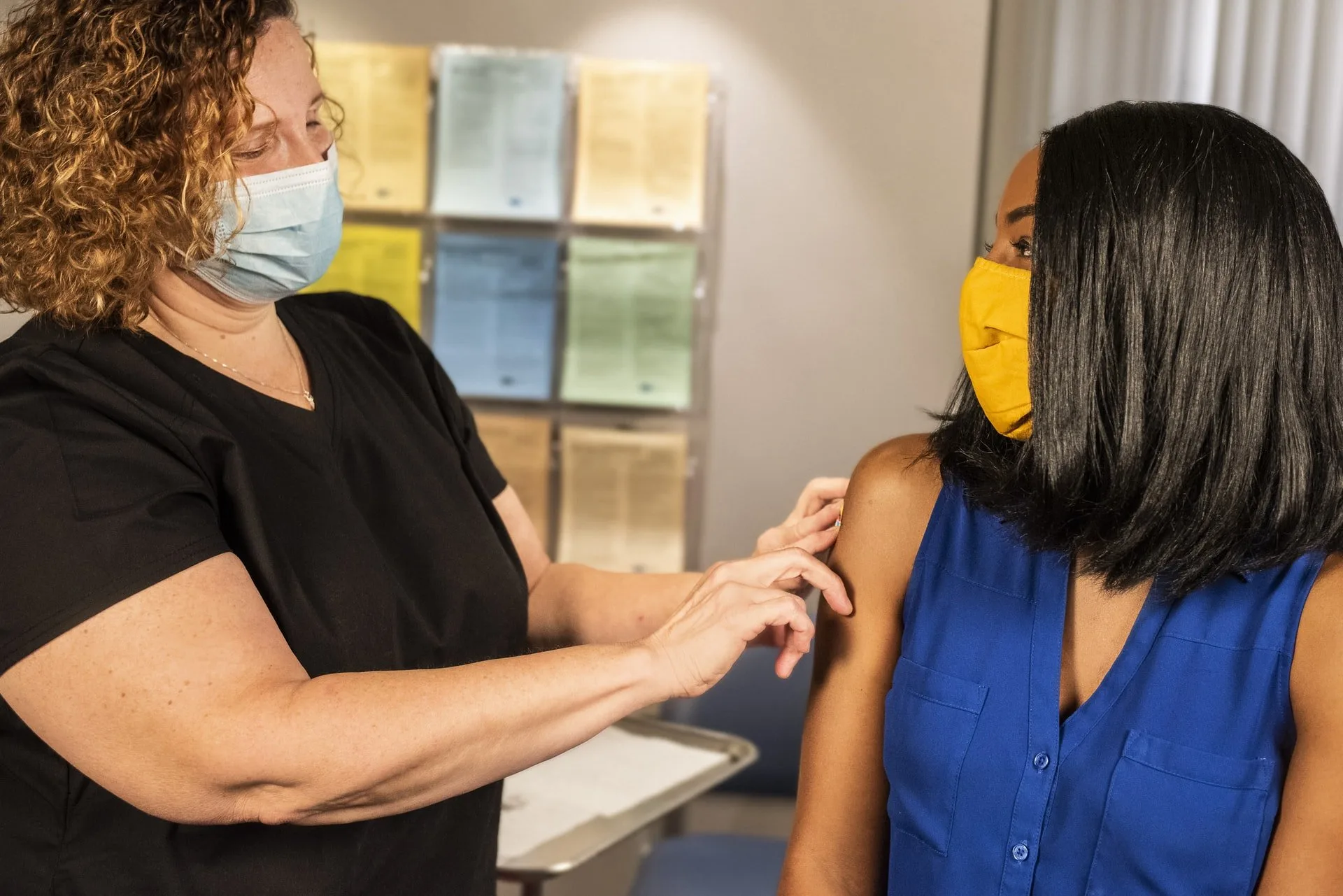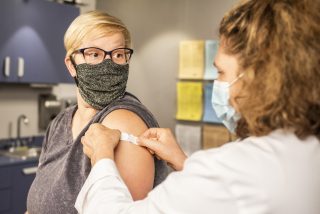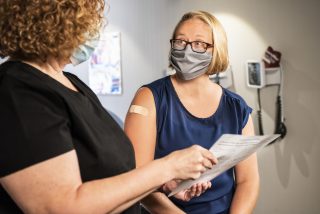When it comes to the COVID-19, you may be interested to know about the sex disparities surrounding the virus. For one, a study published in Frontiers in Public Health revealed that men were more likely to become very sick and die from the coronavirus, and the differences don’t stop there. With millions of people all over the world getting vaccinated, researchers have now noted another difference between the sexes: women are experiencing stronger side effects from the vaccines than men.
Women, vaccines, and side-effects
13 794 904 Americans received the Pfizer and Moderna vaccines (61.2% being women). A month-long study by the Centers for Disease Control and Prevention followed these participants, from December 14, 2020, to January 13, 2021, to see how they reacted to the vaccination shots. Participants reported their side-effects using the vaccine adverse event reporting system (VAERS). The most common side effects reported were headaches, fatigue, and dizziness, along with 62 cases of anaphylaxis.
Of the 6 994 people that reported side effects, 79.1% of them were women. Shelly Kendeffy is a medical technician at State College in Pennsylvania who received the Moderna Covid-19 vaccine. Speaking to The New York Times, Kendeffy revealed she felt that while she felt fine immediately after receiving the shot, she soon began to experience side-effects by the afternoon,

Photo by Joshua Hoehne on Unsplash
“My teeth were chattering, but I was sweating – like soaked, but frozen,” Kendeffy said. She also revealed that six of her seven female colleagues also experienced symptoms like body aches, chills, and fatigue. Now, while the seventh woman didn’t display flu-like symptoms, she did say she spent the night after the vaccine vomiting.
Of the eight male colleagues who were also vaccinated, Kendeffy said one reported soreness, another got a headache, two felt fatigued, while four felt nothing at all.
Women experiencing more anaphylactic reactions
A study published in JAMA this past February found that nearly all the rare anaphylactic reactions to Covid-19 vaccines occurred among women.
The study found that all 19 of the individuals who had experienced such a reaction to the Moderna vaccine have been female, and 44 of the 47 who have had anaphylactic reactions to the Pfizer vaccine were also women.
Has this happened before?
“I’m not at all surprised with this data showing women experiencing stronger side effects than men. In fact, this has actually been observed in the past among other vaccines,” says Vivek Cherian, M.D., an internal medicine physician.
Erika Schwartz, M.D., an internist specializing in hormone-replacement therapy, echoed these statements,
“It seems to be consistent with flu vaccine and reactions women have in general to vaccines,”
What does previous research say?
- A 2013 study published in Vaccine found that women were at higher risk of reactions than men for the 2009 pandemic flu vaccine.
- A 2019 study published in The Journal of Allergy and Clinical Immunology researched anaphylactic reactions to influenza vaccines. They found that between 1990 and 2016, women accounted for 80 percent of all adult anaphylactic reactions to vaccines.
Why is this happening?
Nobody has a definite answer, but there are a few doctors that have their own theories.
- “Physicians suspect (though we actually don’t know for certain!) That’s the reason that likely has to do with estrogen,” says Dr. Cherian.
- Additionally, the findings could also be because men are less likely to visit the doctor: “Women report more information than men, which could also account for the discrepancy,” says Dr. Schwartz.
- “I don’t think there’s enough information to be able to draw any strong conclusions about why this may be occurring more in females than males,” says Amesh A. Adalja, MD, senior scholar at the Johns Hopkins Center for Health Security and an infectious disease expert. Similar to Dr. Schwartz, Dr. Adalja adds that it’s entirely possible that women are just more likely than men to report their symptoms.
- William Schaffner, MD, an infectious disease specialist, and professor at the Vanderbilt University School of Medicine, has his own theory. Speaking to Health, Dr. Schaffner says that women have more autoimmune diseases than men, and it seems to be because their immune system is more reactive.
- Women’s health expert Jennifer Wider also points out that men and women also metabolize drugs differently and unfortunately, clinical trials often do not take into account this difference and the vaccine dose may be on the higher side for female recipients. “Antibody responses to vaccines can also be slightly higher in women than men,” says Dr. Wider, “Research shows more of a difference with age. As a result, the side effect response may be more robust.”
What side-effects should we look out for?
The CDC has come out to say that side effects are normal signs that your body is building protection against the virus, should you ever come into contact with it. That said, possible side effects include:
- Pain in the arm where you got the shot
- Redness around the area where you were vaccinated
- Swelling in the arm where you got the shot
- Tiredness
- Headache
- Muscle pain
- Chills
- Fever
- Nausea
How can I manage side-effects?
If you’re struggling with side-effects, the CDC does say it’s okay to take OTC medications like ibuprofen, acetaminophen, aspirin, or antihistamines. That said, they do advise that you do not take these medications before you get vaccinated as there is not enough research on how these medications might impact how well the vaccines work.
In regards to arm soreness, the CDC suggests putting a clean, cool, wet washcloth over the area where you received your shot or trying to move your arm more. If you have a fever, the CDC says you should drink plenty of fluids and dress lightly.
That said, if you continue to develop severe side effects and the aforementioned mentioned remedies aren’t working, then you need to immediately call your doctor.
It’s not all bad
Now while the last thing you want to deal with is the side-effects from the vaccine, you could also look on the bright side. After all, a reaction to a vaccine could also mean that your body is reacting as it should.

Photo by Hello I’m Nik on Unsplash
“When a person responds to a vaccine there are reactogenic (side effects) and immunogenic (antibodies and T cells) responses. I celebrate both,” says Saralyn Mark, MD, the lead on COVID-19 for the American Medical Women’s Association. “It tells us your body is doing what it needs to do to teach your body to respond in case you are exposed to the virus,” she adds.
So, what now?
“I don’t think women should worry,” says Sabra L. Klein, Ph.D., co-director of the Johns Hopkins Center for Women’s Health, Sex, and Gender Research, “My goal is to educate women about their immune system and understand that when you experience fatigue, headaches, and even fevers, that is all caused by your immune system mounting a robust response to the vaccine. I would rather experience these minor side effects than be sick with COVID-19 or transmit SARS-CoV-2 to my aging parents or neighbors.”
Having said that, it’s important to report any vaccine side effects to your doctor, the CDC, or FDA. You can also access the CDC’s V-Safe program – a smartphone-based tool used to gather data, including side effects on the COVID-19 vaccines.
NOTE:
Longevity LIVE aims to provide the latest accurate information about the COVID-19. At the time of publishing this article, the information in this story was proven to be accurate. However, as the situation surrounding COVID-19 constantly changes, some data may have changed since publication. Therefore, we encourage our readers to stay informed by accessing the CDC and WHO websites for the latest and accurate information.
References
Fink, A. L., & Klein, S. L. (2015). Sex and Gender Impact Immune Responses to Vaccines Among the Elderly. Physiology (Bethesda, Md.), 30(6), 408–416. https://doi.org/10.1152/physiol.00035.2015
Halsey, N. A., Griffioen, M., Dreskin, S. C., Dekker, C. L., et al. (2013). Immediate hypersensitivity reactions following monovalent 2009 pandemic influenza A (H1N1) vaccines: reports to VAERS. Vaccine, 31(51), 6107–6112. https://doi.org/10.1016/j.vaccine.2013.09.066
Jin, J. M., Bai, P., He, W., Wu, F., et al. (2020). Gender Differences in Patients With COVID-19: Focus on Severity and Mortality. Frontiers in public health, 8, 152. https://doi.org/10.3389/fpubh.2020.00152
Shimabukuro, T. T., Cole, M., & Su, J. R. (2021). Reports of Anaphylaxis After Receipt of mRNA COVID-19 Vaccines in the US-December 14, 2020-January 18, 2021. JAMA, 325(11), 1101–1102. https://doi.org/10.1001/jama.2021.1967
Su, J. R., Moro, P. L., Ng, C. S., Lewis, P. W., et al. (2019). Anaphylaxis after vaccination reported to the Vaccine Adverse Event Reporting System, 1990-2016. The Journal of allergy and clinical immunology, 143(4), 1465–1473. https://doi.org/10.1016/j.jaci.2018.12.1003







![women [longevity live]](https://longevitylive.com/wp-content/uploads/2020/01/photo-of-women-walking-down-the-street-1116984-100x100.jpg)










